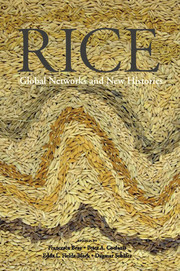Crossref Citations
This Book has been
cited by the following publications. This list is generated based on data provided by Crossref.
Gagnier, Regenia
2017.
A SYMBIOLOGICAL APPROACH TO SEX, GENDER, AND DESIRE IN THE ANTHROPOCENE.
Angelaki,
Vol. 22,
Issue. 1,
p.
11.
Nishiyama, Takashi
2018.
Doctors for Frontier Expansion: Japanese Physicians in Hawaii, 1868–1924.
East Asian Science, Technology and Society: An International Journal,
Vol. 12,
Issue. 3,
p.
257.
SMITH, KATE
2018.
AMIDST THINGS: NEW HISTORIES OF COMMODITIES, CAPITAL, AND CONSUMPTION.
The Historical Journal,
Vol. 61,
Issue. 3,
p.
841.
Smith, Hayden R.
2019.
Carolina's Golden Fields.
Chakraborty, Debarati
and
Ray, Avik
2019.
Population genetics analyses of North-East Indian indigenous rice landraces revealed divergent history and alternate origin of aroma in aus group.
Plant Genetic Resources: Characterization and Utilization,
Vol. 17,
Issue. 5,
p.
437.
Shopov, Aleksandar
2019.
Cities of rice: risiculture and environmental change in the Early Modern Ottoman Balkans.
Levant,
Vol. 51,
Issue. 2,
p.
169.
Queiroz, Ana Isabel
Gomes, Inês
and
Amorim, Inês
2020.
The spectre of historical crop losses: Challenging questions and methodological issues.
Historia Agraria Revista de agricultura e historia rural,
p.
7.
O’Brien, Patrick Karl
2020.
The Economies of Imperial China and Western Europe.
p.
31.
Gerritsen, Anne
2020.
The City of Blue and White.
Carney, Judith A.
and
Watkins, Case
2021.
Arroz, protagonismo africano e a transformação ecológica das Américas.
Boletim do Museu Paraense Emílio Goeldi. Ciências Humanas,
Vol. 16,
Issue. 2,
Mettra, Pierre
2021.
Boisseaux de riz et billets de banque.
Anthropology of food,
Ray, Avik
and
Chakraborty, Abhra
2021.
The edible biota in irrigated, deepwater, and rainfed rice fields of Asia: a neglected treasure for sustainable food system.
Environment, Development and Sustainability,
Vol. 23,
Issue. 12,
p.
17163.
López Jerez, Montserrat
2022.
Factor endowments, vent for surplus and involutionary process in rural developing economies.
Economic History of Developing Regions,
Vol. 37,
Issue. 1,
p.
50.
Watkins, Case
and
Carney, Judith A.
2022.
Amplifying the Archive: Methodological Plurality and Geographies of the Black Atlantic.
Antipode,
Vol. 54,
Issue. 4,
p.
1297.
Zhang, Xin
2022.
What is the Global? Rise and Demise of the Metanarrative on Global Change.
The Chinese Historical Review,
Vol. 29,
Issue. 2,
p.
71.
Faísca, Carlos Manuel
Freire, Dulce
and
Viana, Cláudia M.
2023.
Changing rice geographies: a long-term perspective of Portuguese regional production (1860-2018).
Historia Agraria Revista de agricultura e historia rural,
p.
99.
Grosse-Bley, Jelena
2023.
Rural–Urban Migration and Agro-Technical Change in Post-Reform China.
East Asian Science, Technology and Society: An International Journal,
Vol. 17,
Issue. 1,
p.
118.





